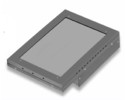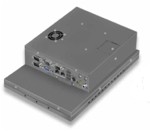Industrial PC vendor distributes Ubuntu
Apr 8, 2008 — by LinuxDevices Staff — from the LinuxDevices Archive — 7 viewsAmpro will begin distributing a Ubuntu Linux derivative with its x86-compatible single-board computers this month, it said. “Ampro Embedded Linux” (AEL) combines a choice of standard or real-time kernel.org Linux with a standard Ubuntu 7.10 filesystem, giving customers a well-tested open-source leg up on evaluation and development, the company suggests.
digg this story |
Ampro said it will distribute AEL on a DVD bundled with all of its board-level system products. These comprise x86-compatible industrial, rugged, and “extra rugged” boards and PCs based on AMD Geode and Intel Architecture processors. Products based on Intel's new lpia (low-power Intel architecture), also known as Centrino Atom (formerly “Menlow”) are also apparently planned, as support for lpia was cited as a primary reason Ubuntu was chosen.


ReadyPanel 10, front and back
(Click either to enlarge)
Ampro plans to unveil AEL at ESC next week, running it on a rugged touchscreen-equipped “ReadyPanel” vehicular PC (pictured above). As shown at ESC, AEL will use the Fluxbox window manager, Hilden Application Framework (made popular by Nokia's Maemo software development project), and a Mozilla-based browser. The system will boot via a user-modifiable GRUB menu into a “desktop” similar to the one below, from Moblin.org's UI Framework page, Ampro said.







Moblin screenshots
(Click any to enlarge)
Why Ubuntu?
Desktop Linux distributions have long been popular as a starting point for device development, because they provide better-tested software than raw upstream source code. Ubuntu is probably the world's most popular desktop Linux distribution, which also makes it perhaps the best-tested, according to Linux's “enough eyeballs” development model. Another advantage is the familiarity provided by using the same distribution on both development host and target systems. For its part, Ampro said it chose Ubuntu because of the availability of both desktop and server variants, worldwide support community, several graphical application environments to choose from, both free and proprietary device drivers, thousands of included programs, and support for Intel's new Centrino Atom chips.
Ubuntu's popularity among device developers has soared in the last two years. Preliminary results from LinuxDevices.com's 2008 Reader Survey suggest that Ubuntu ranks fourth behind only uClinux, Debian, and kernel.org in popularity, with 8.2 percent of respondents embedding Ubuntu over the last two years, and nearly 10 percent planning to do so over the next two. “This rapid adoption curve is all the more remarkable given that it's only the second year we've asked about Ubuntu,” said Henry Kingman, the site's editor.
In time, it also seems possible that Ubuntu parent company Canonical may offer commercial support for Ubuntu Mobile and Embedded (UME), a derivative of the distribution launched last fall concurrently with Ubuntu's 7.10 release. Canonical and Ubuntu Founder Mark Shuttleworth recently predicted Linux dominance in devices, and UME has been closely involved with the Intel-sponsored Moblin project.
More about AEL
AEL will be based initially on the “Gutsy Gibbon” release of Ubuntu, also known as 7.10. However, it will quickly transition to the 8.04 Long Term Support release planned for Apr. 24.
AEL will include standard and real-time kernels, initially built from 2.6.22 kernel.org sources. It will be installable in two versions, one a small footprint build comprised of about 700 Ubuntu packages, and the other a more or less standard desktop Ubuntu version. Both versions will be able to draw pre-built binary and source packages from standard Ubuntu and/or Debian repositories, using the APT package management tools. The small-footprint version of AEL will be installable on media as small as 1GB, if /usr/ and any other large filesystem components are serialized into squashfs files mounted via loopback devices, according to an Ampro FAQ about AEL.
Standard included components of the low-footprint version of AEL include:
- apt-get package management
- X Window System from Xorg project
- Ubuntu Mobile/Embedded GUI (as used by the Intel moblin.org project)
- Web browser (reduced-footprint MID Web browser, based on Mozilla Firefox technologies)
- ssh and sshd support
- “Most conventional Unix daemons and system tools”
- Automatic kernel driver installation for PCI devices (udev)
- USB hotplug (udev)
- sox (including play command) for audio testing
Rick Lehrbaum, CTO of Ampro, stated, “Ampro [is] the embedded industry's first SBC manufacturer to support all of its products with an embedded Linux OS derived from Ubuntu, today's most popular form of Linux.”
Full disclosure: Ampro CTO Rick Lehrbaum also founded LinuxDevices and Ziff Davis Enterprise's DeviceForge group. He returned to Ampro in January, just prior to Ampro's acquisition by Adlink Technology.
This article was originally published on LinuxDevices.com and has been donated to the open source community by QuinStreet Inc. Please visit LinuxToday.com for up-to-date news and articles about Linux and open source.